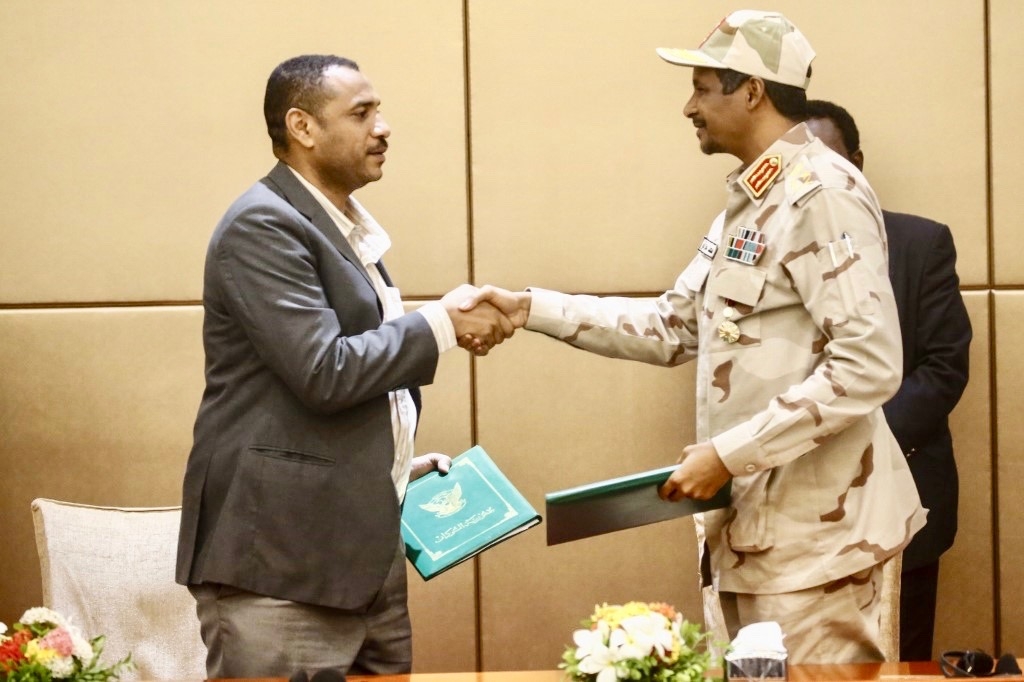Sudan military prepares to hand power to transitional government this month

Sudan’s military rulers will begin taking practical steps to hand over power to a transitional government after resolving more than four months of disputes with the civilian opposition since the ousting of former president Omar al-Bashir amid widespread street protests on 11 April.
According to a constitutional declaration signed on Sunday, the Transitional Military Council (TMC) will cede power on 18 August to a joint civilian-military council that will lead a 39-month transitional period to civilian rule.
A document seen by MEE says the Sovereignty Council will be formed on 18 August, a prime minister appointed on 20 August and a cabinet will be formed on 28 August.
At a ceremony at Khartoum, African Union mediator Mohamed Hassan Lebatt said the final agreement will be formally signed on 17 August with leaders from neighbouring countries and other dignitaries in attendance.ttps://twitter.com/AFP/s
New MEE newsletter: Jerusalem Dispatch
Sign up to get the latest insights and analysis on Israel-Palestine, alongside Turkey Unpacked and other MEE newsletters
tus/1157978235742904320?s=20
The deputy chairman of the military council, Mohamed Hamdan Daglo, confirmed the TMC’s commitment to the implementation of the agreement. “In this historic moment, we confirm our commitment to the implementation of this declaration,” he said.
The leader of the Sudanese Congress Party, Omar al-Digiar, said the main tasks of the transitional period will be holding accountable those responsible for killing protesters and conducting a national peace process in warring areas.
The constitutional declaration will establish regulations and laws for the transitional period, after which there will be a general election and passage of a permanent constitution.
The declaration settles many areas of dispute, including placing the army, Rapid Support Forces (RSF) militia and security organisations under the Sovereignty Council.
According to the document, the council will be formed of 11 members, including five civilians and five from the military, while the final member will be agreed upon by both sides.
The Sovereignty Council will also be responsible for the appointment of a general prosecutor and a chief justice, in addition to holding the rights to declare war or states of emergency.
According to document, “Sudan will be a democratic, multi-party country ruled by a parliamentary system”.
Ibtisam Sanhori, a member of the civilian legal committee, said on Saturday that the two sides had agreed on representation in parliament, in which the civilian opposition Forces of Freedom and Change will control 67 percent of the 300 seats.
The military will appoint the ministers of defence and interior.
Sudanese legal expert and human rights advocate Wail Ali said that the constitutional declaration will establish the framework for the transitional period and the ties between the different levels of governance.
Still, he told MEE that the nature of the transitional period - joint rule by military and civilians - may create problems for imposing the rule of law.
“The hybrid formation of the Sovereignty Council and the existence of the military within it will create an atmosphere of immunity, and it will be difficult to establish accountability.
“The situation for human rights will be difficult to maintain because the ministers of defence and interior will be appointed by the military,” he added.
Middle East Eye delivers independent and unrivalled coverage and analysis of the Middle East, North Africa and beyond. To learn more about republishing this content and the associated fees, please fill out this form. More about MEE can be found here.





